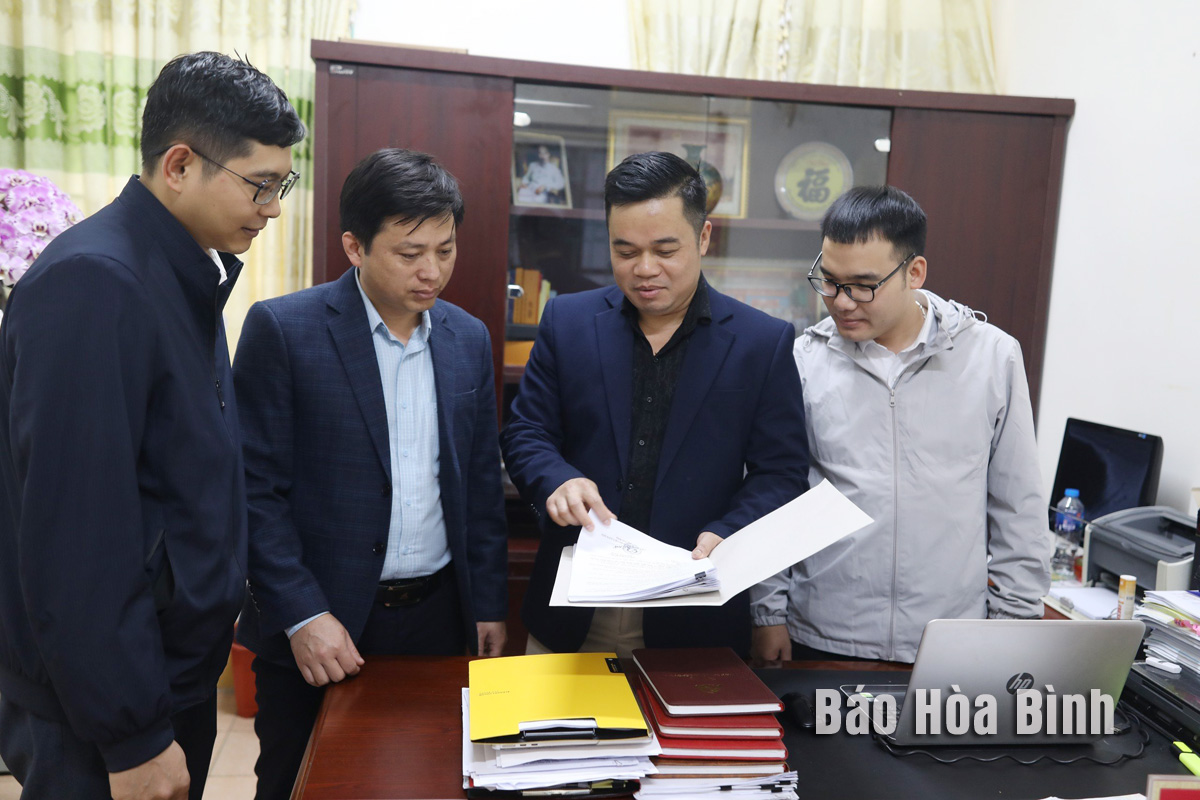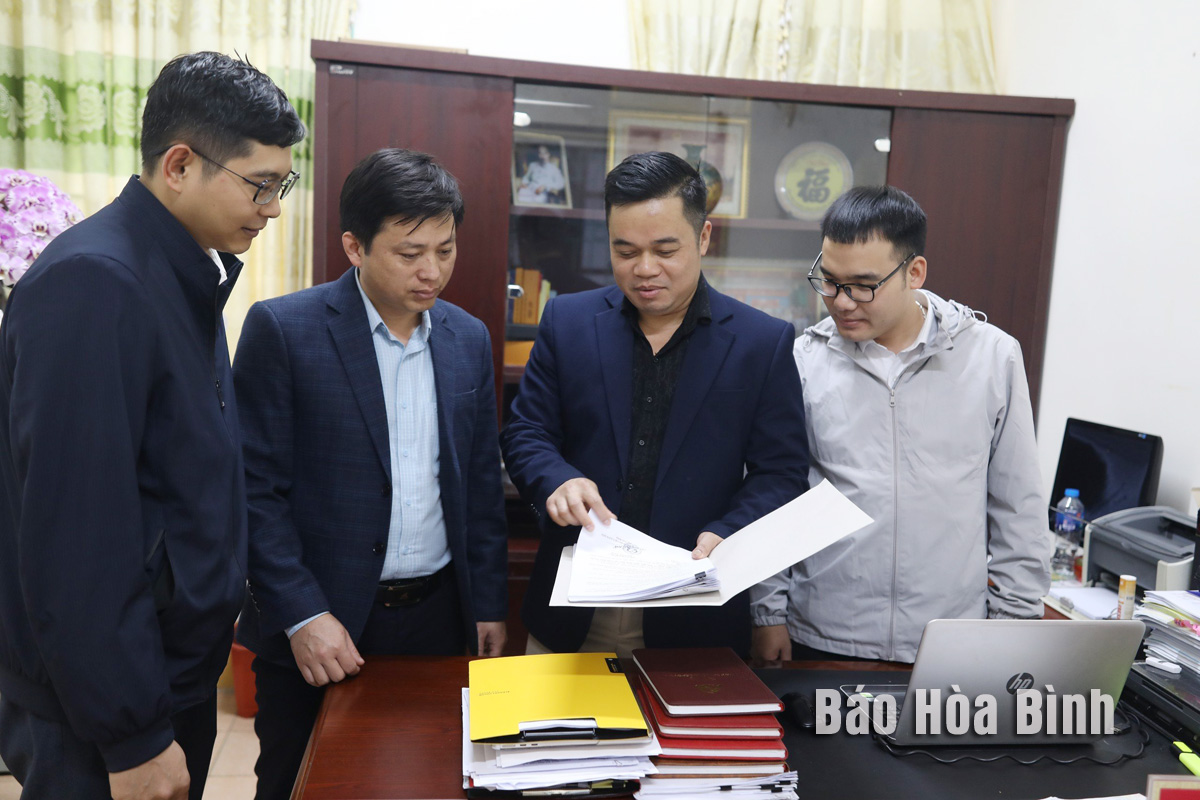
Over the past years, Cao Phong district of Hoa Binh province has rolled out comprehensive measures to develop its contingent of officials and public servants with high quality, thus meeting the requirements in building the Party and political system, and serving the local socio-economic development.
Officials of Cao Phong district’s
Division of Home Affairs discuss the management of officials and public
servants in the locality.
Khuong Xuan Lich, Chairman of the People’s Committee of Bac Phong commune, said
that in recent years, with the support of the district, the commune has made
planning and review of the local contingent of officials and public servants
serving personnel training and organisation.
Currently, the commune has 20 officials and public servants, of whom 19 have
university degrees, and the remainder has a college degree. The college degree
holder will receive further training to get a university degree soon. They have
shown strong performance in implementing their tasks, helping to promote the
growth of the locality.
In 2003, the commune’s per capita income reached 51 million VND (2,040 USD),
said Lich, adding that the commune is striving to become an advanced new-style
rural area.
Vu Duc Hong, Deputy Head of the Division of Home Affairs of Cao Phong district,
said that the district currently has 76 officials and public servants at
district level and 205 at communal level. The district has paid great attention
to managing, training and appointing officials and strengthening administrative
discipline.
In 2023, the district issued decisions to appoint, re-appoint, mobilise and
change the working positions of 41 officials, while reducing eight others.
In the first quarter of 2024, the district People's Committee mobilised 12 commune-level
civil servants, converted the positions of three commune-level civil servants,
appointed one Commander of the Commune Military Command, and mobilised and
appointed four district-level civil servants. The district has developed a 2024
job position project for specialsed departments and public service units and
submitted it to the provincial Department of Home Affairs for verification,
said Hong.
Alongside, the district has also paid great attention to personnel training to
enhance the professional capacity of local officials and public servants. As a result, the quality, capacity and working attitude of officials and public
servants in Cao Phong has been greatly improved, meeting the requirements in
the new period.
According to Hong, in the coming time, the district will continue to coordinate
with relevant agencies to better conduct personnel organisation, ensuring high
efficiency of the district’s apparatus.
In the spirit of "Party members go first, the people follow”, all households of Party members in the Doan Ket sub-region in Da Bac town, Da Bac district, voluntarily removed gates and fences, and donated land when the road expansion project passed through their properties. Inspired by their example, 68 households in the sub-region quickly followed suit, contributing over 1,400 sq.m of residential and perennial cropland to widen the main road through the residential area. The exemplary role of Party members in Doan Ket stands as a shining example of studying and following President Ho Chi Minh’s thought, morality, and lifestyle.
The Hoa Binh provincial People's Committee held a monthly meeting on May 29 to assess the implementation of socio-economic development tasks in the first six months of 2025, the progress of key projects, and some other important issues.
During his lifetime, President Ho Chi Minh always expressed his deep affection and special concern for children and youth. He once emphasized: "Caring for and educating children well is the responsibility of the entire Party and the entire people”; "First of all, the family (i.e. grandparents, parents, siblings) must do this job well”. "the Party Committees…, the Children’s Committee, the Youth Union, the education sector, and all related organizations must have specific plans to ensure children grow healthier and more progressive”. His teachings has been remaining valuable and serving as the guiding principles in the work of protecting, caring for, and educating children. In line with this ideology, Hoa Binh Province has continuously been prioritizing and investing resources in the well-being of children in recent years.
Mr. Nguyen Phi Long, the alternate Member of the Party Central Committee and Secretary of the Provincial Party Committee chaired the meeting of the Standing Committee of the Provincial Party Committee to provide opinions on several investment projects within the province. There was the attendance of Ms. Bui Thi Minh, the Permanent Deputy Secretary of the Provincial Party Committee and Chairwoman of the Provincial People’s Council; Mr. Bui Đuc Hinh, the Deputy Secretary of the Provincial Party Committee and Chairman of the Provincial People’s Committee and other members of the Standing Committee; the leaders from other departments, agencies, and some localities.
The Standing Board of the Vietnam Fatherland Front (VFF) Committee of Hoa Binh province held a meeting on May 28 to honour outstanding village elders, village heads, and reputable individuals from local ethnic minority and religious communities.
In mid-May, the provincial Museum organised an exhibition named "Duoi la co Dang Cong san Viet Nam quang vinh” (Under the flag of the glorious Communist Party of Vietnam). This meaningful activity took place in the joyful atmosphere to celebrate the country's major holidays and the Party congresses at all levels for the 2025-2030 term, towards the 14th National Party Congress.



